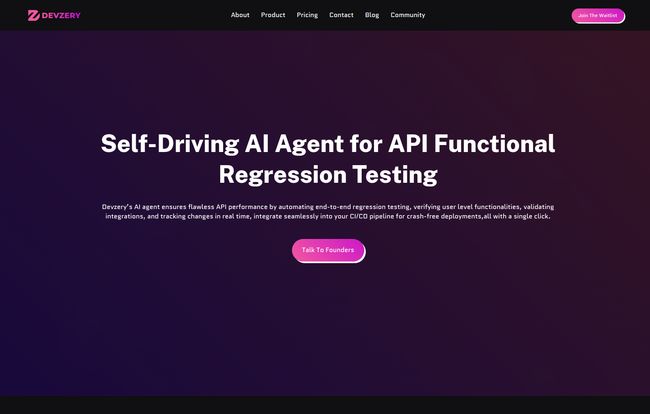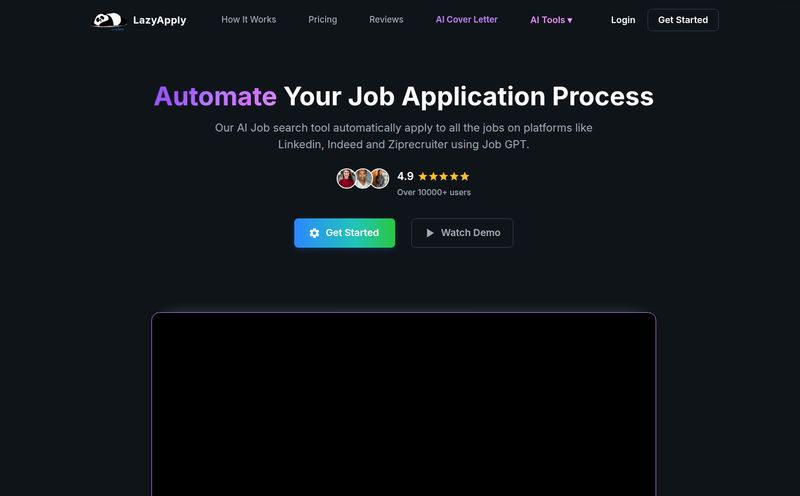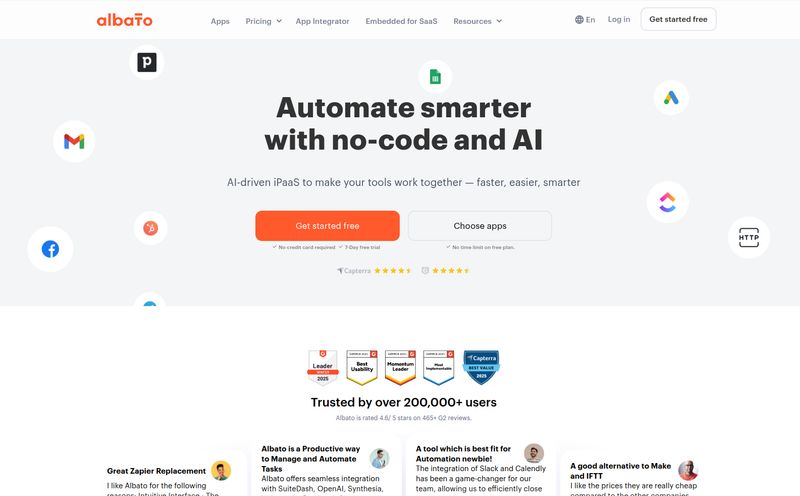In the world of SEO and digital marketing, speed is everything. If a client's site is slow or buggy, my carefully crafted campaigns for traffic generation are basically pointless. For years, the bottleneck has always been the same: the dreaded development cycle. And a huge part of that cycle? Testing. Specifically, the monotonous, soul-crushing grind of API regression testing.
We've all been there. A new feature is ready, the team is hyped, and then… it breaks something that was working perfectly yesterday. Cue hours of manual testing, frantic Slack messages, and delayed releases. It's a tale as old as code itself. So when a tool comes along with a tagline like "Self-Driving AI Agent for API Functional Testing," my inner cynic and my hopeful tech-nerd get into a fistfight. The cynic says, "Yeah, right. Another AI buzzword salad." But the nerd whispers, "What if... what if it actually works?" That's the rabbit hole I fell down with a platform called Devzery.

Visit Devzery
So What Is Devzery, Really?
Let’s cut through the marketing jargon. Devzery is an AI tool designed to automate one of the most painful parts of software development: ensuring your APIs don't break every time you push an update. Think of it less as a simple test runner and more like a junior QA engineer that you can train in minutes. You feed it your Product Requirement Documents (PRDs), user flows, or even just let it watch how your app works, and its AI gets to work.
It uses this information to automatically generate test cases. Not just generic ones, but tests that supposedly understand the context of your application. This is the core promise: moving away from manually writing and maintaining hundreds of fragile test scripts to an intelligent system that does the heavy lifting. For anyone who's spent a weekend trying to figure out why a perfectly good test started failing for no reason, that promise is… well, it’s pretty darn appealing.
The Features That Genuinely Caught My Eye
A pretty website is one thing, but the feature set is where the rubber meets the road. I’ve seen countless platforms promise the world, so I was keen to see what Devzery was actually packing under the hood.
The AI Magic: Test Case Generation and Management
This is obviously the main event. The idea that an AI can read a PRD and create a comprehensive test suite is a bold claim. Devzery’s approach is to use its generative AI to cover user flows from end to end. Instead of just checking if an endpoint returns a `200 OK`, it aims to simulate actual user interactions across multiple APIs. It’s the difference between checking if a car's engine turns on and actually taking it for a test drive through city traffic.
What's more, it centralizes all of this in an AI-enabled test management dashboard. You can search, filter, and see your coverage at a glance. It's a small quality-of-life thing that becomes a huge timesaver when you're trying to hunt down a specific test failure before a big deployment.
A Unified Hub for Your Entire Workflow
I have a pet peeve with tools that force you to live on an island. If it doesn't play nice with the rest of my stack, it's a non-starter. Devzery seems to get this. It’s built to be a unified platform, combining UI, API, and integration tests in one place. But the real win is the integrations.
It connects directly with project management tools like Jira and, more importantly, with CI/CD pipelines. Seeing native support for Jenkins, GitHub Actions, and GitLab is a massive green flag. This means you can run your regression suite automatically with every new build, catching bugs before they ever see the light of day. This is how you achieve those crash-free deployments everyone dreams about. This isn't just about testing; it's about building a reliable, automated quality gate right into your development process.
"We've been turning around features twice as fast since we brought Devzery on board. Our test coverage is higher than ever, and our QA team can now focus on exploratory testing instead of repetitive checks. It's been a game-changer." - Anuj Kumar, a testimonial from their site that actually sounds plausible.
Documentation on Autopilot? Be Still My Heart
Let's be real, nobody likes writing API documentation. It's tedious, it's easy to forget, and it's almost always out of date. Devzery has a feature that automatically generates Swagger documentation from your APIs. For developers, this is pure gold. It means new team members can get up to speed faster, and front-end and back-end teams have a single source of truth to work from. Honestly, this feature alone could be worth the price of admission for some teams.
Let's Talk Money: A Breakdown of Devzery's Pricing
Okay, so it sounds cool, but what's it going to cost? This is often where these revolutionary tools fall flat, with opaque pricing or insane enterprise contracts. Devzery's approach is refreshingly straightforward.
They offer three main tiers:
- Basic ($0/month): This is a genuinely useful free plan. You get one user, one project, and 150 AI-generated tests per month. It includes CI/CD integration and their browser extension for bug management. This is perfect for freelancers, startups, or for just taking the platform for a proper test drive without talking to a single salesperson. I love this.
- Pro ($25/month): This seems like the sweet spot for most small to medium-sized teams. It bumps you up to 5 users, 2 projects, and unlimited AI-generated tests. You also get more advanced features like custom questions for targeted regression, better reporting, and priority support. At this price point, its a very compelling offer.
- Enterprise (Talk to Founders): This is your classic "if you have to ask, it's a lot" plan. But the "Talk to Founders" angle is interesting. It suggests a more hands-on, partnership approach rather than being funneled to a faceless sales team. This plan includes a dedicated account manager, custom analytics, and bespoke integrations.
The existence of a powerful free tier is a huge vote of confidence in their own product. They're basically saying, "Here, try it. We know you'll like it."
The Potential Roadblocks to Consider
No tool is a magic wand. As excited as I am about the potential here, it's important to be realistic. The effectiveness of the AI test generation is going to lean heavily on the quality of the information you give it. If your PRDs are vague or your project details are a mess, you can't expect the AI to work miracles. Garbage in, garbage out, as they say.
There's also likely a bit of a learning curve. Integrating it into a complex, existing CI/CD pipeline might require some initial setup and configuration. It’s not a one-click install that instantly solves all your problems. You'll need to invest some time upfront to get the most out of it. But in my experience, any tool worth its salt requires the same.
Frequently Asked Questions about Devzery
Is Devzery just for API testing?
While its core strength is AI-powered API regression testing, the platform is designed as a unified hub. It aims to handle UI, API, and integration tests to give you a complete picture of your application's health, all without needing to switch between different tools.
How hard is it to get started?
With a free "Basic" plan, the barrier to entry is virtually zero. You can sign up and start playing around. The initial setup will depend on the complexity of your project, but the process seems designed to be intuitive—feed it your docs or user flows and let the AI take a first pass.
Will Devzery replace my entire QA team?
Absolutely not. And that's a good thing. The goal of a tool like this isn't to replace human testers but to empower them. It automates the repetitive, predictable, and time-consuming parts of regression testing, freeing up your skilled QA professionals to focus on what they do best: exploratory testing, usability testing, and finding those complex, edge-case bugs that automation might miss.
How does this compare to a tool like Postman?
Postman is a fantastic tool for creating and running manual or scripted API requests. It's an API client at its heart. Devzery operates at a higher level of abstraction. It's not just for running tests; it's for generating and managing them intelligently based on your project requirements. It's more of an end-to-end QA automation platform than a simple request builder.
Is the codeless automation really codeless?
For the most part, yes. The main value proposition is that you don't need to be a test automation engineer to create a robust regression suite. The AI handles the test case generation. However, for complex or highly custom scenarios, you'll likely still benefit from having some technical knowledge to guide and refine the process.
What kind of results can I realistically expect?
The company claims things like a "2X Faster Bug-Free Software Release" and a "3X Reduction in Development Costs." While your mileage may vary, the core benefits are clear: reduced manual effort, earlier bug detection in the CI/CD pipeline, and better test coverage. Even a 20-30% improvement in these areas can have a massive impact on a project's timeline and budget.
My Final Verdict on Devzery
So, am I a convert? I'm definitely intrigued. Deeply intrigued. Devzery is tackling a real, expensive problem in the software world. The approach of using AI to understand project requirements and generate meaningful tests is a significant step forward from just scripting endpoints. It feels less like simple automation and more like genuine assistance.
This isn't just about saving a few hours here and there. It's about fundamentally changing the dynamic between development and QA. It’s about building confidence in your release process and, as a result, getting new features and fixes to your users faster. And in my world of SEO and online business, speed to market is the name of the game. For any team feeling the pain of slow, manual testing cycles, giving Devzery's free plan a spin seems like an absolute no-brainer.



